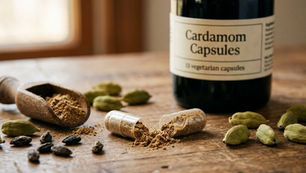top of page
Insights from Nature


Why Seasonal Stress Makes Your Digestion Feel Off-Balance
Seasonal stress often arrives quietly. It does not always feel intense or overwhelming, but it lingers in the background of daily life. As seasons shift, routines change, daylight shortens, and expectations subtly increase, many people begin to notice that their digestion feels different. Meals may feel heavier. Fullness can linger longer than expected. Digestive comfort may feel inconsistent or harder to predict.
These changes are easy to misinterpret as digestive problems


How Early Year Stress Impacts Your Gut and Emotional Balance
The early months of the year often arrive with quiet pressure. New schedules begin. Responsibilities return after the holidays. Expectations feel fresh but demanding. Even when life appears calm on the surface, many people notice subtle tension building beneath it.
This early-year stress does not always feel dramatic. It may show up as restlessness, changes in digestion, emotional sensitivity, or a sense of imbalance that is hard to explain. These experiences are closely co


Why Warm and Comforting Foods Lift Your Mood During Winter
As winter settles in, many people notice a quiet shift in how food feels emotionally. Warm meals become more appealing. Simple dishes feel more satisfying. Eating slows down and feels more intentional. These changes are often described as comfort eating, but the comfort people experience in winter goes deeper than habit or nostalgia.
Warm and comforting foods tend to feel mood lifting during winter because they align with how the body and mind respond to colder weather, sho


Winter Meal Timing and Why We Eat Differently on Colder Days
As winter settles in, many people notice that their eating schedule starts to feel different. Hunger may arrive earlier in the evening. Breakfast might feel less urgent in the morning. Meals become more predictable, and spontaneous eating feels less common.
These changes are often blamed on routine disruptions or personal habits. In reality, meal timing is closely connected to the environment. Cold weather gently reshapes when people feel hungry, when meals feel most satisf


Why Cold Weather Gently Sparks a Stronger Sense of Hunger
When winter arrives, many people notice a familiar change in their daily routine. Hunger shows up sooner. Meals feel more satisfying. The urge to snack becomes harder to ignore, especially in the afternoon or early evening. It is easy to assume that this stronger hunger is caused by habits, lack of discipline, or emotional eating. In reality, hunger is not simply a matter of choice. It is a physical signal that responds to the environment. Cold weather gently reshapes how hun


Seasonal Appetite: How Cold Weather Shapes Hunger and Cravings
As the temperature drops, many people start to notice that their appetite changes. Hunger may arrive at unfamiliar times. Meals can feel more satisfying than usual. Cravings often shift toward foods that feel warm, familiar, and comforting. These changes can be easily misinterpreted as emotional eating or a loss of routine. In reality, appetite is not a fixed signal. It is a responsive system that adjusts to the environment. Seasonal appetite reflects how the body adapts to c


Why Hearty Winter Meals Feel Gently More Satisfying
Winter meals often leave a different kind of impression. Not just fullness, but a quiet sense of being settled. A bowl of stew, a warm grain dish, or a slow-cooked meal can feel deeply satisfying in a way that lighter foods sometimes do not during colder months.This satisfaction is not simply about calories or portion size. It is gentler, steadier, and longer lasting. Hunger fades without urgency. Cravings soften. The body feels grounded rather than stimulated.This experience


Winter Hydration Hurdles: How They Shape Digestive Impact
Winter quietly changes the way the body relates to hydration. Thirst feels softer. Drinking becomes less instinctive. Warm rooms replace outdoor air. And without realizing it, many people move through colder months slightly underhydrated.Unlike summer, where heat and sweat make hydration obvious, winter dehydration is subtle. It rarely announces itself through intense thirst. Instead, it shows up indirectly—through digestion that feels heavier, fullness that lingers longer, a


Winter’s Reduced Light: How Does It Influence Digestive Rhythm?
Winter does more than lower temperatures. It quietly reshapes the way the body experiences time itself. Days shorten. Sunlight fades earlier. Mornings arrive slowly, and evenings stretch longer than expected. While these changes are often associated with mood or energy, fewer people realize how deeply reduced winter light influences digestive rhythm.Digestion does not operate in isolation. It follows daily cycles shaped by light, movement, temperature, and emotional pace. Whe


Winter Indoor Habits: Subtle Ways They Align with Gut Rhythm
Winter quietly reshapes daily life by moving it indoors. Doors close earlier. Lights turn warmer. Movement slows. Time stretches differently. While these changes are often viewed through the lens of comfort or convenience, they also create subtle shifts inside the body—especially in how digestion feels and flows.Many people notice that digestion in winter feels calmer, heavier, or slower without being able to explain why. Meals linger longer. Fullness settles more deeply. Hun


Why Warm Herbs Are Common in Winter Medicine Traditions
Winter has always shaped how humans relate to plants. Across cultures and centuries, cold seasons consistently bring one pattern into focus: the use of warm herbs. From spiced teas to slow-simmered decoctions, winter medicine traditions tend to favor herbs that create warmth, circulation, and internal steadiness. This pattern appears long before modern nutrition science. It shows up in ancient medical systems, folk remedies, and everyday household practices. The repetition is


How Winter Mood Influences Your Everyday Eating Patterns
Winter changes more than temperature and daylight. It quietly reshapes mood, emotional rhythm, and the way people relate to food throughout the day. Meals feel different. Appetite shifts. Certain foods feel more comforting, while others lose their appeal. These changes often happen gradually, without a clear starting point.Many people assume these shifts are about willpower or habit. In reality, winter mood plays a significant role in shaping everyday eating patterns. As ligh


Why So Many People Feel More Bloated During the Colder Months
As the weather turns cold, many people begin to notice a subtle but persistent change in how their body feels. The abdomen seems fuller by evening. Clothes feel slightly tighter. Meals that once felt comfortable now leave a lingering sense of pressure. This sensation is often described as bloating—and it tends to appear more frequently during the colder months. For some, it shows up after meals. For others, it builds slowly throughout the day. The experience can feel confusin


Why Your Stomach Feels So Heavy After Big Holiday Meals
Holiday meals are meant to be joyful. Long tables. Shared dishes. Slow conversations that stretch late into the evening. Yet after these meals, many people notice the same familiar sensation: the stomach feels unusually heavy, full, and slow. This feeling often raises questions. Did I eat too much? Is my digestion struggling? Why does this happen more during holidays than on regular days?In reality, post holiday stomach heaviness is rarely a sign of digestive failure. It is m


Cardamom Capsules Explained: How They Work and Who Benefits Most
Cardamom is often called the “Queen of Spices.” Its warm, aromatic flavor shows up in everything from Masala Chai to baked goods and savory dishes across the world. Many people love the taste of cardamom in food - but let’s be honest: not everyone has the time, patience, or palate to chew fibrous seeds or brew spiced tea every day. As interest in plant-based wellness continues to grow, cardamom has gained attention beyond the kitchen. This has led to rising curiosity around


Gastric Temperature and Digestion: What Changes in Winter
Winter changes digestion in ways that are often felt but rarely explained. Meals feel warmer, heavier, and more grounding. Fullness settles differently. Comfort foods seem easier to receive. Beneath these experiences lies a subtle but important factor that shapes winter digestion: gastric temperature.Gastric temperature refers to the warmth within the stomach and digestive tract during and after eating. While it is rarely discussed in everyday nutrition conversations, it play


Why We Crave Warm Comforting Foods on Cold Winter Nights
Cold winter nights invite a different relationship with food. As the temperature drops and daylight fades earlier, many people notice a natural pull toward warm, comforting meals. Soups simmer longer. Ovens stay on. Warm drinks replace cold ones. These cravings are not sudden habits or emotional weakness. They reflect a seasonal pattern shaped by biology, environment, and long standing cultural rhythms.Winter cravings are deeply connected to how the body responds to cold, dar


How Cold Weather Naturally Affects Your Digestive Movement
Cold weather quietly reshapes the way the body moves from the inside. While people often notice changes in appetite or food preferences during winter, fewer realize that digestive movement itself also adapts to the season. Meals may feel slower to settle. Fullness can linger. The internal rhythm that moves food through the digestive system begins to feel calmer and more deliberate.These changes are not signs that digestion is failing. They are part of a natural seasonal adjus


Why Digestion Feels Heavy and Sluggish in Winter
Winter often brings a subtle yet noticeable shift in how digestion feels. Meals that once felt light may now sit longer. Hunger arrives differently. A sense of fullness lingers, even after familiar foods. These changes are common across climates and cultures, and they are not random.Digestive heaviness in winter reflects a seasonal rhythm shaped by temperature, light, daily movement, and emotional pace. As the environment cools, the body naturally adapts its internal timing.


The Complete Science Behind Natural Winter Digestion Slowdown
Winter is a season when many people feel their digestion shift in subtle yet noticeable ways. This guide explores the soft science behind winter digestion slowdown, blending seasonal physiology, appetite rhythm, cultural food practices, & everyday lived experiences. The purpose is not to diagnose digestive problems but to offer clear lifestyle insights that help readers understand why digestion feels different in winter and how to support it with warmth and mindful routines.


Winter Digestion: A Complete Guide to Seasonal Physiology, Appetite Rhythm, and Cold-Weather Eating Patterns
Winter alters the way the body moves, regulates temperature, and responds to food. The colder air, slower mornings, and limited daylight all create a natural shift that people around the world feel every year. Soups, warm spices, gentle meals, and cozy comfort cuisine begin to appear more often on the table. These are not random cravings. They reflect deep seasonal rhythms that guide appetite, warmth, and energy conservation during the cold months. This guide explains why dig


Green Tea Detox for the New Year: Your Fresh Start Power Boost
One of the simplest and most effective allies for a New Year detox is green tea. Green tea is rich in antioxidants, particularly catechins such as EGCG (epigallocatechin gallate), which help neutralize harmful free radicals and support the body’s natural detoxification processes. In addition, green tea can gently boost metabolism and enhance mental alertness, making it an ideal choice for a fresh start to the year.


Are Clove Capsules Safe? A Research-Based Look at Dosage, Limits, and Overuse
Clove capsules have become a widely used natural option for supporting digestion, immunity, and antioxidant balance. As interest in herbal supplements continues to grow globally, questions about clove capsules safety, safe daily limits, and potential side effects have become increasingly important. Many users want to understand how much is safe, how clove supplement dosage limits are determined, and what risks may appear with overuse. This guide provides a research-grounded e


Raw Cloves vs Clove Capsules: Which Form Delivers Better Health Benefits?
Clove is one of the most antioxidant-rich botanicals in the world, used for centuries in digestive wellness, oral care, immunity, and metabolic balance. Today, many people wonder whether consuming raw cloves is more beneficial than taking clove capsules. Both forms offer advantages, but they differ in potency, consistency, absorption, and practicality. Understanding these differences helps users choose the best format for their wellness routine.
bottom of page